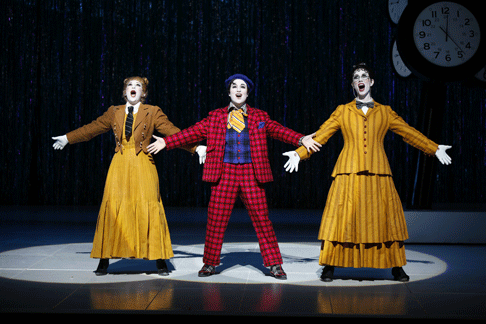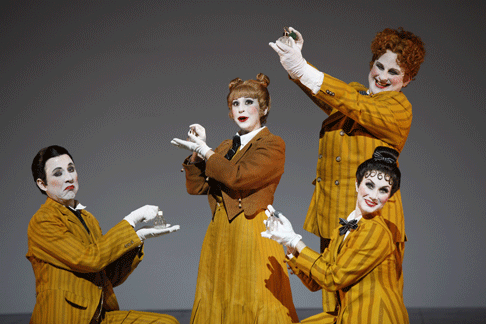![Jean-Paul Fouchécourt as King Ouf and François Loup as Siroco [Photo by Carol Rosegg courtesy of New York City Opera]](http://www.operatoday.com/L_Etoile0040.gif)
26 Mar 2010
L’Etoile, NYCO
Mark Lamos’ production of Chabrier’s L’Etoile is perfectly ridiculous.
English Touring Opera are delighted to announce a season of lyric monodramas to tour nationally from October to December. The season features music for solo singer and piano by Argento, Britten, Tippett and Shostakovich with a bold and inventive approach to making opera during social distancing.
This tenth of ten Live from London concerts was in fact a recorded live performance from California. It was no less enjoyable for that, and it was also uplifting to learn that this wasn’t in fact the ‘last’ LfL event that we will be able to enjoy, courtesy of VOCES8 and their fellow vocal ensembles (more below …).
Ever since Wigmore Hall announced their superb series of autumn concerts, all streamed live and available free of charge, I’d been looking forward to this song recital by Ian Bostridge and Imogen Cooper.
Although Stile Antico’s programme article for their Live from London recital introduced their selection from the many treasures of the English Renaissance in the context of the theological debates and upheavals of the Tudor and Elizabethan years, their performance was more evocative of private chamber music than of public liturgy.
Evidently, face masks don’t stifle appreciative “Bravo!”s. And, reducing audience numbers doesn’t lower the volume of such acclamations. For, the audience at Wigmore Hall gave soprano Elizabeth Llewellyn and pianist Simon Lepper a greatly deserved warm reception and hearty response following this lunchtime recital of late-Romantic song.
For this week’s Live from London vocal recital we moved from the home of VOCES8, St Anne and St Agnes in the City of London, to Kings Place, where The Sixteen - who have been associate artists at the venue for some time - presented a programme of music and words bound together by the theme of ‘reflection’.
'Such is your divine Disposation that both you excellently understand, and royally entertaine the Exercise of Musicke.’
‘And there was war in heaven: Michael and his angels fought against the dragon; and the dragon fought and his angels, And prevailed not; neither was their place found any more in heaven … that old serpent … Satan, which deceiveth the whole world: he was cast out into the earth, and his angels were cast out with him.’
There was never any doubt that the fifth of the twelve Met Stars Live in Concert broadcasts was going to be a palpably intense and vivid event, as well as a musically stunning and theatrically enervating experience.
‘Love’ was the theme for this Live from London performance by Apollo5. Given the complexity and diversity of that human emotion, and Apollo5’s reputation for versatility and diverse repertoire, ranging from Renaissance choral music to jazz, from contemporary classical works to popular song, it was no surprise that their programme spanned 500 years and several musical styles.
The Academy of St Martin in the Fields have titled their autumn series of eight concerts - which are taking place at 5pm and 7.30pm on two Saturdays each month at their home venue in Trafalgar Square, and being filmed for streaming the following Thursday - ‘re:connect’.
The London Symphony Orchestra opened their Autumn 2020 season with a homage to Oliver Knussen, who died at the age of 66 in July 2018. The programme traced a national musical lineage through the twentieth century, from Britten to Knussen, on to Mark-Anthony Turnage, and entwining the LSO and Rattle too.
With the Live from London digital vocal festival entering the second half of the series, the festival’s host, VOCES8, returned to their home at St Annes and St Agnes in the City of London to present a sequence of ‘Choral Dances’ - vocal music inspired by dance, embracing diverse genres from the Renaissance madrigal to swing jazz.
Just a few unison string wriggles from the opening of Mozart’s overture to Le nozze di Figaro are enough to make any opera-lover perch on the edge of their seat, in excited anticipation of the drama in music to come, so there could be no other curtain-raiser for this Gala Concert at the Royal Opera House, the latest instalment from ‘their House’ to ‘our houses’.
"Before the ending of the day, creator of all things, we pray that, with your accustomed mercy, you may watch over us."
The doors at The Metropolitan Opera will not open to live audiences until 2021 at the earliest, and the likelihood of normal operatic life resuming in cities around the world looks but a distant dream at present. But, while we may not be invited from our homes into the opera house for some time yet, with its free daily screenings of past productions and its pay-per-view Met Stars Live in Concert series, the Met continues to bring opera into our homes.
Music-making at this year’s Grange Festival Opera may have fallen silent in June and July, but the country house and extensive grounds of The Grange provided an ideal setting for a weekend of twelve specially conceived ‘promenade’ performances encompassing music and dance.
There’s a “slide of harmony” and “all the bones leave your body at that moment and you collapse to the floor, it’s so extraordinary.”
“Music for a while, shall all your cares beguile.”
The hum of bees rising from myriad scented blooms; gentle strains of birdsong; the cheerful chatter of picnickers beside a still lake; decorous thwacks of leather on willow; song and music floating through the warm evening air.
![Jean-Paul Fouchécourt as King Ouf and François Loup as Siroco [Photo by Carol Rosegg courtesy of New York City Opera]](http://www.operatoday.com/L_Etoile0040.gif)
Mark Lamos’ production of Chabrier’s L’Etoile is perfectly ridiculous.
This would be most unsuitable — if this post-Offenbach operetta of 1877 were anything but a perfection of ridiculousness. The gentlemen in bowler hats, bouncing up and down like pistons! the ladies whose mourning frocks and veils are instantaneously transformed into the can-can frippery of rejoicing! the lead singers on scooters! the backdrop that itself becomes tipsy when the mad King Ouf sings a tribute to Chartreuse (the lighting changes at that point too)! the fun-house mirrors that enclose (and might as well describe) the action — which will strike Americans as “Gilbertian,” though Gilbert got his ideas from Offenbach, too.
In the City Opera’s quest to re-establish and re-present itself to New York as the opera company that does what the Met isn’t going to do, Chabrier (the production has already been seen there in 2002) is an excellent place to start. The melodies are light in a slyer way than Offenbach’s, with more opportunity for harmonious display, as in the “kissing” quartet in Act III. The choruses are not mere background, and in the Lamos production give the City Opera ladies and gents a chance to strut to a Broadway standard, all the while singing at a rather higher one. The wit of the piece is the kind of froth that so often evaporates when the Met attempts operetta, and it wouldn’t work at NYCO either if it were not so elegantly presented and if we were not all used to surtitles by now. Ideally, such a work should be given in the vernacular and in a small house, but that’s true of Rossini’s comic operas too — and of Shostakovich’s The Nose, for that matter, concurrently doing sell-out business across the plaza.
The story of L’Etoile makes one reflect on the deep philosophical import of The Mikado. The tyrant here, King Ouf I (I guess that should be le Roi Ouf Ier), always celebrates his birthday with festivities climaxing in a public execution. Knowing this, his subjects are on their best behavior at that time of year — but Lazuli, a boy from out of town, falls into the trap of resenting the world because he is unhappily in love with a strange girl he met on the road. Before he can be impaled on a booby-trapped armchair, however, the royal astrologer discovers that he — Lazuli — is destined to die precisely one day before the king does. (Date unspecified.) The king thereupon decides to spare the boy — which is good news for Siroco, the astrologer, whom the king has condemned to die fifteen minutes after the king does. But Lazuli does not want to live without his adored Laoula — despite the fond attentions of the ladies of the court — and attempts to drown himself. And Laoula, it turns out, is not a traveling cosmetics saleswoman (her disguise) but the princess next door, betrothed to King Ouf. Ouf, like Gilbert’s Koko, prefers life to love-death and orders the lovers wed. “And we’ll have two executions next year,” he consoles his delighted subjects.
 Jennifer Zetlan as Laoula, Julie Boulianne as Lazuli, and Liza Forrester as Aloès
Jennifer Zetlan as Laoula, Julie Boulianne as Lazuli, and Liza Forrester as Aloès
Everyone loves a comic villain, and Jean-Paul Fouchécourt’s King Ouf is the joy of this occasion — as he was in his NYCO debut as Rameau’s frog-nymph Platée. He is the joy of the costume designer Constance Hoffman as tiny Ouf stomps about “in disguise” in the largest overcoat in captivity, and the joy of the conductor, the joyous Emmanuel Plasson, as he warbles his song of Chartreuse ecstasy, his high tenor mated with François Loup’s low bass, and he is the joy of everyone present as he caricatures tiny men with too much power, in his bloodthirst, his lust, his cowardice, his egotism. I heard Fouchécourt last month singing Satie’s Socrate to accompany Mark Morris’s choreography; he was splendid, but he’s far too much fun on stage to let him languish in any pit. Morris should have let him dance.
I was less thrilled with Julie Boulianne as the boyish Lazuli, on purely vocal grounds. Like so many boyish roles in French opera (and theater), the part is written for a young woman, and when Frederica von Stade sang it, her famous charm and musicality conquered all. But Boulianne, though she has a solid technique and many pretty notes (at least high ones — she faded out on lower lines), suffered intonation problems throughout the first act, often landing just shy of otherwise good, clear tones. Too, her trilled “kisses” lacked body, and the joke is not a good one without genuine trills. Only in the quartet, when obliged to intone the extremely musical name “La-ou-la,” did her vocal appeal make the proper effect.
 William Ferguson as Hérisson de Porc-Épic, Jennifer Zetlan as Laoula, Andrew Drost as Tapioca, and Liza Forrester as Aloès
William Ferguson as Hérisson de Porc-Épic, Jennifer Zetlan as Laoula, Andrew Drost as Tapioca, and Liza Forrester as Aloès
Tiny Jennifer Zetlan was charming as the princess, but tall Liza Forrester, as her confidant and abettor in tickling strange sleeping men, had a mezzo that made me daydream of hearing her in many larger, more rewarding roles. The supporting parts in this opera are numerous and were all cast with City Opera folk who sang elegantly and cavorted stylishly. Style, the essence of Chabrier, was also the essence of the silly evening.
John Yohalem